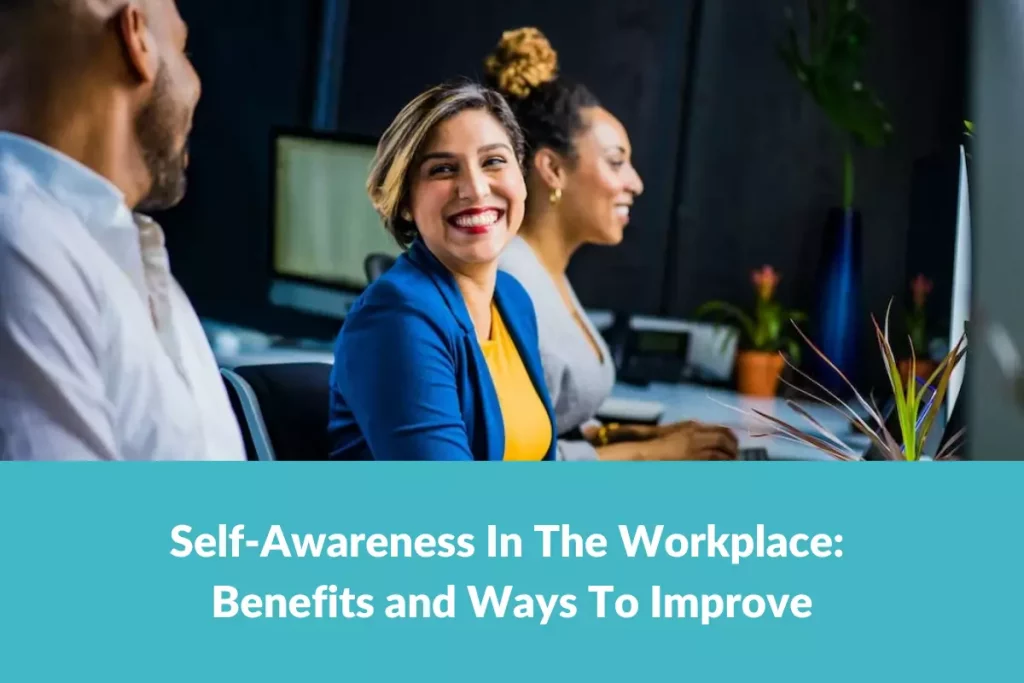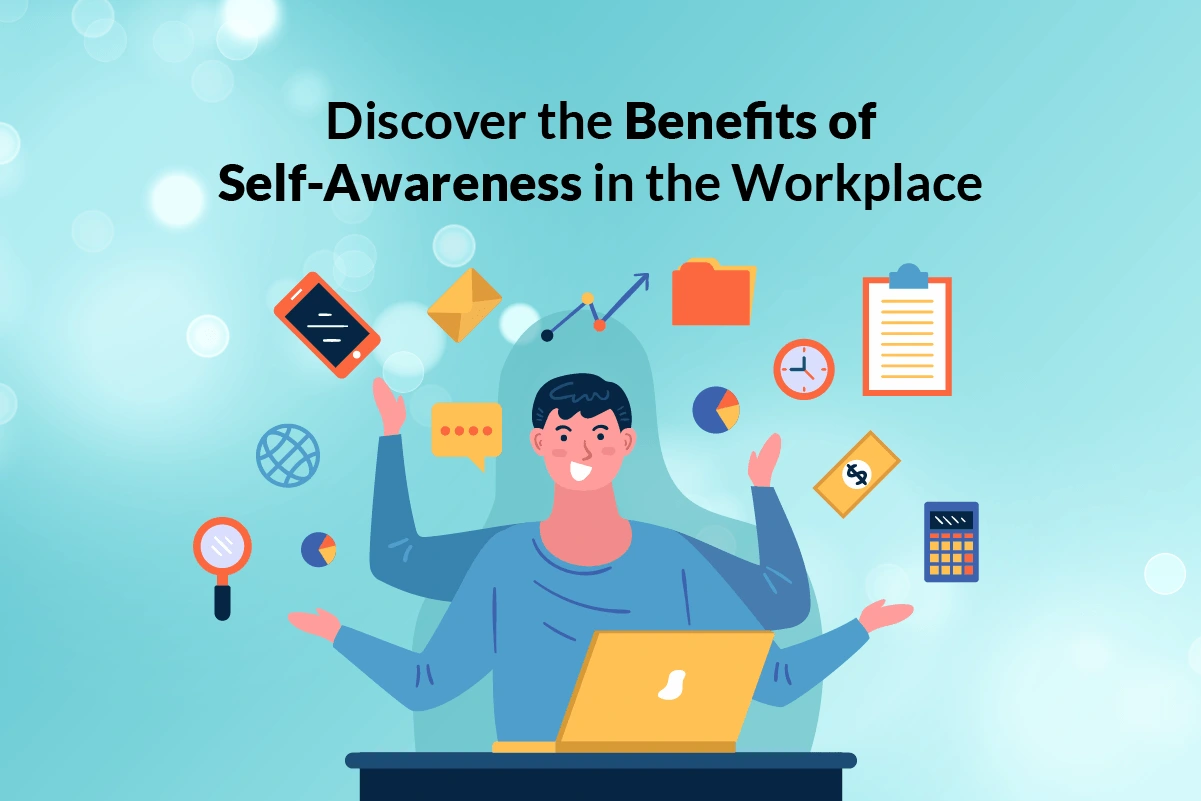Self-awareness in the workplace is an essential skill that enables you to be more conscious of your weaknesses and strengths. Honing this will help enhance your relationships and improve your productivity.
No one is born with self-awareness, as it is a skill that needs to be learned, strengthened, and refined over time. Today, we will define self-awareness, why it is essential, and how to develop it in the workforce.

What Is Self-Awareness?
Self-awareness refers to being able to think about yourself and see the “self” as something you can shape and control.
You recognize this “self” as a distinct but inseparable part of your existence. It is where nurture and nature mix to create who you are.
The “self” part is extremely powerful! However, if you are unaware of your “self,” this power can either be wasted or harm others.
Self-awareness goes further than the simple understanding of the “self” and your surroundings. There are some levels of awareness, and each can help you better understand your current state.

We break down those levels below to help you visualize the process better.
- What are you doing?
This initial level of awareness is also the most basic. It covers the understanding of your existing situation and actions in your vicinity.
Someday, there will be challenges and distractions you need to overcome. So, understanding what they are will help you to focus more on the tasks at hand.
- What are you feeling?
The next level deals more with your reactions and emotions to things around you. Once you have determined your current focus, it is time to center your thoughts around how you feel about your actions and experiences.
- Where are your blind spots?
The final level asks for a robust skill for reflection. It requires you to take a deep look at your situation and yourself and identify areas you lack.
Everyone has weak points and blind spots, but the key is identifying these points and reframing them into a growth mindset.
Benefits of Being Self-Awareness at Work
Manage Your Time Better
If you truly know yourself well, then you will know when and how you work best. For example, if you know you’re usually more productive in the morning because you have more energy, completing complex tasks or large amounts of work in the morning is the most ideal.
If you know you need to minimize distractions when working, you should work in a quiet place, if possible, or buy some noise-canceling headphones.
Deal With Stress Better
This part of self-awareness is knowing what triggers you to feel angry, defensive, or stressed. Thanks to that, it is easy to respond to them more calmly as they surface.
You can even go on a walk or take a few moments to breathe and collect your thoughts. It may prevent you from forming a knee-jerk reaction that only increases your (and your colleagues’) stress levels.
Knowing what can help to reduce your stress is also the key here. Being self-aware also means taking care of yourself and resting to avoid burnout.
Take On Feedback Better
Receiving feedback is not always a pleasant experience, right?
One of the significant benefits of being self-aware is that you already know about the oncoming feedback.
That way, you are likely to be more open to constructive criticism, then learn from it. It is best to consider it as an opportunity to improve your self-awareness.
Understand the Impact of Your Emotions on Others
In addition to benefiting you, self-awareness also benefits those around you. Knowing your emotions and moods well will help you understand how they can impact others.
For example, if you are feeling particularly stressed, you will know how this can radiate and how to minimize this situation.
There is nothing wrong with bringing negative emotions to your work. However, if you feel it is affecting others’ moods or your work, you should discuss it with your boss or manager and receive some support.
Feel More Confident in Your Ability
Self-awareness includes getting to know your talents and strengths. It can help you feel more confident at work.
If your role is geared towards something other than your skills, you should talk to your manager or boss about how you can incorporate more tasks that play to your strengths.
How to Develop Self-Awareness in the Workforce?
Self-awareness is a complex skill that will take energy, time, and practice to master. There are some ways you can practice being present with your emotions and yourself, which, in turn, can help improve your self-awareness.
Practice Mindfulness
Mindfulness is a practice that enables you to be aware of what’s happening in your body, mind, and environment. Meditation is one of several practices you can insert into your daily life and is also an excellent tool for developing better self-control.

Here are some great ideas for mindfulness activities to start:
- Paint or draw.
- Organize your space.
- Name your surroundings.
- Practice deep breathing.
Keep a Journal
Journaling is an excellent way to pay closer attention to what is happening in your public and private self. It’ll also help you to recognize patterns that may or may not serve you. Here are some prompts you can use:
- What challenges did you face today?
- What did I do well today?
- What was I feeling?
- How did you respond? In retrospect, would you have reacted differently?
- What strengths did you use to keep you focused on the best version of yourself?
- What is your intention for tomorrow?
Ask Other People About Their Perception of You
Feedback is not as scary as you think. We recommend asking other people how they perceive you in a specific situation.
Getting specific would give you the most concrete feedback. Become brave and ask others how they would like to see you behave.
You can make two possible columns.
- Column 1: How you see yourself.
- Column 2: How other people see you.
Column 1 should include words to describe your behaviors and attitude at the time. Meanwhile, column 2 is a list of feedback from others. There may be a few blind spots you need to attend to.
Say Sorry When Necessary
Mistakes sometimes happen, but self-awareness will allow you to recognize when you need to apologize.
Perhaps you lashed out at colleagues or have been challenging yourself to reach out recently. Whatever the mistake was, you should say sorry (and mean it) and then change your behavior.
Talk Therapy
A therapist will work with you during therapy, like CBT (cognitive behavioral therapy), to address negative behaviors or thought patterns.

For example, by understanding the underlying cause of your negative behaviors and thoughts, you are in a more advantageous position to modify them and utilize healthy coping mechanisms.
The Bottom Line
Self-awareness means you take the effort and time to understand yourself better and take a deeper assessment of your surroundings. That way, you can make informed decisions that will help you improve your life.
The path to self-awareness is a journey. The most self-aware ones see themselves on a quest to mastery instead of at a particular destination. When you move forward in developing your self-awareness, frequently ask yourself, “How will I move toward the best version of myself today?”

